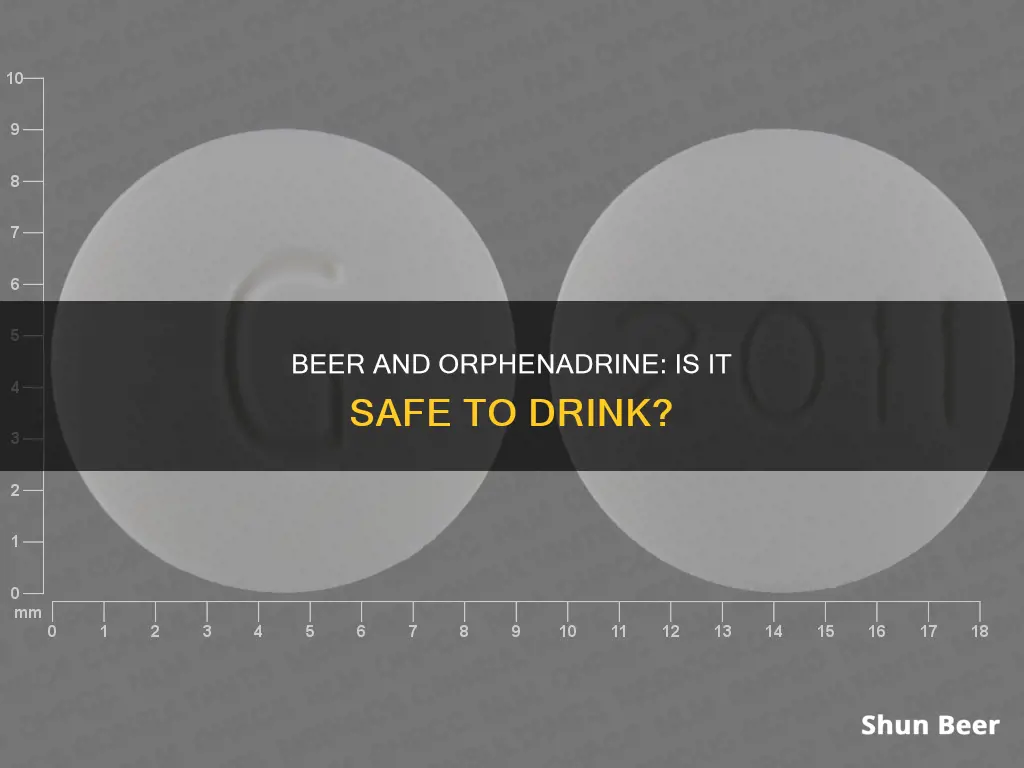
Drinking alcohol while taking muscle relaxers is not advised, as it can lead to serious health problems and even death. Both substances are central nervous system depressants, which slow down activity in the brain and nervous system. This can alter perception, behaviour, and movement in dangerous ways. When combined, the side effects of both substances are intensified, increasing the risk of dangerous symptoms such as increased drowsiness, dizziness, impaired coordination, memory problems, seizures, and overdose.
Orphenadrine (Norflex) is a muscle relaxant, so it is recommended that you avoid or limit your alcohol consumption while taking this medication. Alcohol can increase the nervous system side effects of orphenadrine, such as dizziness, drowsiness, and difficulty concentrating. It is advised to talk to your doctor or pharmacist if you have any questions or concerns about mixing alcohol and orphenadrine.
| Characteristics | Values |
|---|---|
| Should I drink beer after taking orphenadrine? | No |
| Why? | Both orphenadrine and alcohol are central nervous system depressants, which slow down brain activity and can lead to drowsiness, dizziness, impaired coordination, problems with memory, and an increased risk of seizures and overdose. |
What You'll Learn

Why you shouldn't drink beer after taking orphenadrine
Orphenadrine is a muscle relaxant, a type of prescription medication used to relieve pain caused by muscle spasms and spasticity. It works by blocking nerve impulses that cause painful muscle contractions. When someone experiences a muscle spasm, the muscle contracts and tightens involuntarily, causing a lot of pain and discomfort. Orphenadrine helps to relieve this pain by relaxing the muscle and preventing spasms from occurring.
While orphenadrine can be effective in treating muscle pain, it is important to avoid consuming alcohol while taking this medication. This is because both orphenadrine and alcohol have a depressant effect on the central nervous system, which can lead to dangerous side effects when combined.
Intensified Side Effects
Both orphenadrine and alcohol can cause side effects such as drowsiness, dizziness, and impaired coordination. When combined, these side effects can become more intense and pronounced. This can lead to an increased risk of falls, accidents, and injuries. Poor vision and confusion are also possible side effects, further increasing the risk of harm.
Impaired Judgment and Cognitive Function
The combination of orphenadrine and alcohol can also lead to impaired judgment and cognitive function. Individuals may experience clouded thinking, dangerous mood swings, and aggressive behaviours. This can result in risky decision-making and engagement in activities that would normally be avoided.
Increased Risk of Overdose and Addiction
Mixing orphenadrine and alcohol increases the risk of overdose due to the enhanced sedative effects of both substances. Respiratory depression can occur, causing difficulty breathing or even stopping breathing altogether, which can be life-threatening. Additionally, the combination of these substances can lead to addiction, as both act on the brain's reward centre, creating a cycle of dependence and increased tolerance.
Damage to Internal Organs
Consuming alcohol while taking orphenadrine can cause damage to internal organs, particularly the liver and kidneys. The liver is responsible for processing both alcohol and orphenadrine, and when they are combined, it has to work harder, leading to potential liver damage. Long-term use of either substance can also increase the risk of kidney damage and cognitive function impairment.
In conclusion, it is clear that drinking beer or any other form of alcohol while taking orphenadrine is not recommended due to the potential for harmful side effects and serious health risks. It is important to follow the advice of your healthcare provider and avoid combining these substances to ensure your safety and well-being.
Beer and Covid 19: What's Safe to Drink?
You may want to see also

The dangers of mixing orphenadrine and alcohol
Orphenadrine is a prescription muscle relaxant that helps to relieve pain caused by muscle spasms and spasticity. It works by blocking nerve impulses that cause painful muscle contractions. While orphenadrine can be effective in managing muscle pain, it is important to be aware of potential interactions and side effects, especially when mixed with alcohol.
Alcohol is a central nervous system depressant, meaning it slows down activity in the brain and nervous system. Similarly, orphenadrine also has depressant effects on the central nervous system. This means that combining orphenadrine and alcohol can lead to an amplification of their respective side effects, resulting in serious health risks.
Short-Term Effects
Mixing orphenadrine and alcohol can have immediate detrimental effects, primarily related to impairment and motor control. The combination of these substances can lead to increased dizziness, drowsiness, and impaired coordination. This can make it dangerous to operate machinery or drive a vehicle, increasing the risk of accidents and injuries. The mixture may also result in poor vision, confusion, impaired judgment, mood swings, and aggressive behaviours.
Long-Term Effects
The long-term effects of mixing orphenadrine and alcohol are even more concerning. Continual ingestion of both substances can lead to damage to internal organs, particularly the liver and kidneys. Mixing these substances also increases the risk of developing a substance use disorder, as both act on the brain's reward centre, creating a cycle of dependence and addiction.
Other Risks
The combination of orphenadrine and alcohol can lead to an increased risk of overdose, as the sedative effects of both substances are intensified. This can result in respiratory depression, coma, and even death. Additionally, gastrointestinal damage can occur due to the individual effects of alcohol and prescription medications on the GI tract.
In conclusion, it is clear that the dangers of mixing orphenadrine and alcohol far outweigh any potential benefits. It is crucial to avoid consuming alcohol while taking orphenadrine to prevent serious health complications and negative consequences. If you have any questions or concerns about the use of orphenadrine and alcohol, it is important to consult with a healthcare professional.
Beer and Diverticulitis: What You Need to Know
You may want to see also

The side effects of orphenadrine and alcohol
Orphenadrine is a muscle relaxer, a type of prescription medication used to relieve pain caused by muscle spasms and muscle spasticity. It works by blocking nerve impulses that cause painful muscle contractions.
Mixing orphenadrine with alcohol can be dangerous—even lethal. Both substances are central nervous system depressants, which means they slow down activity in the brain and central nervous system. They also share common side effects such as dizziness, drowsiness, nausea, and impaired coordination. When combined, these side effects become more intense and can lead to serious health problems.
The short-term effects of mixing orphenadrine and alcohol include impaired coordination, lethargy, confusion, and poor vision. The ability of these substances to depress the central nervous system can lead to an inability to think clearly, impaired judgment, dangerous mood swings, and aggressive behaviours. Mixing orphenadrine and alcohol also increases the risk of falls, car accidents, and other injuries.
The long-term effects of mixing orphenadrine and alcohol are even more concerning. Both substances can cause damage to the liver and kidneys, as well as problems with cognitive function and memory. There is also an increased risk of developing a substance use disorder, especially for women. Mixing these substances can lead to liver damage, as the liver has to work overtime to process both. It can also lead to addiction, as both substances act on the brain's reward centre, and overdose, as the sedative effects of both are compounded.
Overall, it is clear that orphenadrine and alcohol should not be mixed. The potential negative consequences far outweigh any perceived benefits. If you or someone you know has mixed these substances, it is important to seek medical help immediately and monitor vital signs such as breathing, pulse, and level of consciousness.
Beer's Power: Removing Trapped Gas, Always
You may want to see also

What to do if you've mixed orphenadrine and alcohol
Mixing orphenadrine and alcohol can have serious consequences. Both substances are central nervous system depressants, which means they slow down brain activity and can slow functions like breathing and heart rate. They can also make you feel calm or sleepy.
If you've already mixed orphenadrine and alcohol, it's important to take the following steps:
Stop consuming alcohol immediately: Stop drinking and do not consume any more alcohol or orphenadrine.
Seek medical help: Call emergency services or go to the nearest emergency room, even if you're not experiencing any symptoms. It's better to be cautious and get checked by a healthcare professional, especially if you've had more than one drink or don't drink often.
Provide information: Be honest with medical professionals about what substances you've consumed and the quantities. This will help them provide the appropriate treatment.
Monitor vital signs: Keep an eye on the person's breathing, pulse, and level of consciousness while waiting for medical help. If they become unconscious or their breathing becomes shallow or irregular, perform CPR if you're trained to do so.
Stay with the person: Do not leave them alone. If they lose consciousness, place them in the recovery position to prevent choking in case of vomiting.
Follow medical advice: Once medical help arrives, follow the instructions of the healthcare professionals. They may administer treatments such as activated charcoal or intravenous fluids to help stabilise the person's condition.
Prevent future incidents: After the situation has been resolved, have an open and honest conversation about the dangers of mixing orphenadrine and alcohol. Encourage the person to seek help if they have a problem with substance use.
Please note that these are general guidelines, and it's always best to seek medical advice from a healthcare professional if you have any concerns or questions about mixing orphenadrine and alcohol.
Texas Teen Beer Laws: What's Allowed?
You may want to see also

Treating orphenadrine and alcohol addiction
Orphenadrine is a muscle relaxer used to treat skeletal muscle conditions such as pain or injury. It is important to note that orphenadrine is a habit-forming drug and should be kept away from anyone with a history of drug abuse or addiction. When taking orphenadrine, it is advised that you do not drink alcohol as it can increase the nervous system side effects of the drug, such as dizziness, drowsiness, and difficulty concentrating. It can also impair your thinking and judgment. Combining orphenadrine with alcohol can lead to dangerous side effects or even death.
If you are struggling with addiction to orphenadrine and alcohol, it is important to seek professional help. Here are some steps you can take to treat orphenadrine and alcohol addiction:
- Talk to a doctor or healthcare provider: They can help assess your condition, provide guidance, and refer you to appropriate treatment options. Be honest about your substance use and any other mental or physical health issues you may have.
- Detox and Withdrawal Management: The first step in treating addiction is often detox and withdrawal management. Due to the potential side effects and dangers of withdrawal, it is important to do this under medical supervision. Doctors can provide medications to help manage withdrawal symptoms and make the process safer and less distressing.
- Inpatient or Outpatient Treatment: Depending on the severity of your addiction and your individual needs, you may choose inpatient or outpatient treatment. Inpatient treatment involves staying in a residential facility and receiving 24-hour care, while outpatient treatment allows you to live at home while attending regular therapy sessions.
- Behavioural Therapies: Behavioural treatments, such as cognitive-behavioural therapy (CBT), can help you identify and change the behaviours that lead to substance abuse. It can also teach you coping strategies to avoid relapse.
- Mutual-Support Groups: Joining support groups such as Alcoholics Anonymous (AA) or other 12-step programs can provide peer support and a sense of community during your recovery journey. These groups can offer valuable added support when combined with professional treatment.
- Medication-Assisted Treatment: Certain medications can help reduce cravings and the urge to drink. Examples include naltrexone, acamprosate, and disulfiram. These medications are non-addictive and can be used in combination with other forms of treatment.
- Address Co-Occurring Mental Health Issues: Many people with substance use disorders also struggle with mental health conditions such as depression, anxiety, or trauma-related disorders. It is important to seek treatment for these co-occurring issues as they can impact your recovery.
- Aftercare and Relapse Prevention: Treatment doesn't end with the completion of a program. Develop an aftercare plan with your treatment team to prevent relapse and continue your recovery journey. This may include ongoing therapy, support group participation, or sober living arrangements.
- Build a Support System: Surround yourself with a strong support system of family and friends who can provide encouragement and accountability. They can also help you identify triggers and support you in avoiding situations that may lead to relapse.
- Practice Self-Care: Self-care is an important part of the recovery process. This includes maintaining a healthy diet, exercising regularly, getting enough sleep, and finding healthy coping strategies to manage stress.
Remember, seeking professional help is crucial when treating addiction. The road to recovery may have setbacks, but with persistence and the right support, change is possible.
Beer Sleeves: Do They Keep Drinks Cool?
You may want to see also
Frequently asked questions
No, it is not recommended to consume alcohol while taking orphenadrine. Alcohol can increase the nervous system side effects of orphenadrine, such as dizziness, drowsiness, and impaired judgment. Mixing the two can lead to serious health problems, including respiratory depression and even death.
The side effects of orphenadrine and alcohol overlap and can be intensified when the substances are combined. This includes increased nervous system side effects such as dizziness, drowsiness, nausea, impaired coordination, and poor judgment.
If you have mixed orphenadrine and alcohol, it is important to stop consuming alcohol immediately. Seek medical help if needed, especially if you experience any negative side effects or symptoms such as extreme tiredness, impaired movement, or abnormal heartbeat.







